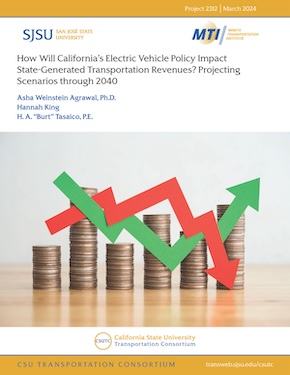- 408-924-7560
- mineta-institute@sjsu.edu
- Donate
How Will California’s Electric Vehicle Policy Impact State-Generated Transportation Revenues? Projecting Scenarios through 2040
California faces unprecedented uncertainty about how much revenue the state will raise from a package of taxes on motor fuels and annual registration fees on light-duty vehicles that was established in 2017 by Senate Bill 1 (SB 1). The SB 1 taxes are by far the largest source of revenue that the State of California generates to support maintenance, operations, and improvements for state highways, and the funds also contribute substantially to local transportation and public transit budgets.
To help policymakers navigate the uncertainty about future SB 1 transportation revenue, this study used spreadsheet models to project revenue from the SB 1 taxes through 2040 under a set of eight scenarios that consider a wide range of possible futures. The scenarios consider changes to revenue that could arise from implementation of California’s zero-emission vehicle (ZEV) regulations, as well as potential changes in driving costs, population size, vehicle ownership rates, and trucking industry operations.
Key findings include:
- It is impossible to project future revenues with any confidence for more than a few years into the future. By 2040, annual revenue ranges from a low of $4.81 billion to a high of $12.15 billion.
- The state may lose substantial revenue if the SB 1 taxes and fees are not changed and/or replaced within the coming few years. In 2027, just three years out, projected annual revenue for some scenarios drops by more than a billion dollars below 2024 revenue.
- A fast ICE to ZEV transition would significantly reduce annual revenue—but so could changes in VMT.
- Fuel taxes currently provide most SB 1 revenue, but by 2040 California may rely on vehicle registration fees to provide most of the revenue.
ASHA WEINSTEIN AGRAWAL, PHD
Dr. Agrawal works at San José State University, where she is the Director of MTI’s National Transportation Finance Center, the MTI Education Director, and a Professor of Urban and Regional Planning. Her research agenda is guided by a commitment to the principles of sustainability and equity: what policy and planning tools can communities adopt to encourage environmentally-friendly travel and improve accessibility for people struggling with poverty or other disadvantages? Dr. Agrawal has researched transportation funding policy questions for more than 25 years. Her work focuses on holistic evaluation of the advantages and challenges of different tax and fee options for raising transportation revenues, as well as public opinion about different tax and fee options. She earned a BA in Folklore and Mythology from Harvard University, an MSc in Urban and Regional Planning from the London School of Economics and Political Science, and a PhD in City and Regional Planning.
HANNAH KING
Ms. King is a doctoral candidate at UCLA’s Institute of Transportation Studies and Department of Urban and Regional Planning. Her research focuses on transportation finance, travel behavior, and transportation equity. At Florida State University she earned MS degrees in Urban and Regional Planning and Geographic Information Systems, as well as a BS in Applied Economics. Prior to starting her doctoral studies, Ms. King worked for the state of Florida providing technical assistance to local governments as they planned for the effects of sea-level rise.
H.A. “BURT” TASAICO, PE
Mr. Tasaico is an MTI Research Associate and retired Director of Strategic Initiatives and Program Support for the North California Department of Transportation. He worked for 40 years both in the private and public sectors in all phases of transportation planning, modeling, programming, funding and revenue forecast, and cash management. He is also a member and past officer of many professional organizations, including former AASHTO Financial Management Fellow, former Vice-chair of AASHTO’s Transportation Policy Forum, and a member of the Transportation Research Board’s Committee on Economics and Finance (AJE50).
-
Contact Us
San José State University One Washington Square, San Jose, CA 95192 Phone: 408-924-7560 Email: mineta-institute@sjsu.edu






